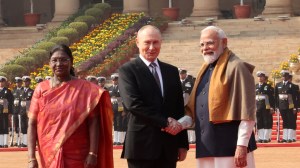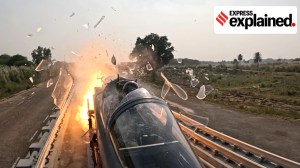At last, a system in place to protect future Dubeys
On the Supreme Court’s prodding, the Government has formally empowered the Central Vigilance Commission (CVC) to act on the complaints ...

On the Supreme Court’s prodding, the Government has formally empowered the Central Vigilance Commission (CVC) to act on the complaints of whistleblowers and give protection to them.
Though this is only an interim arrangement based on a notification issued by the Personnel Ministry on April 21, India has joined the select band of four democracies protecting whistleblowers: US, UK, Australia and New Zealand.
Despite the ongoing elections, the Government was forced to take this major policy decision because of the judicial activism displayed by a Supreme Court bench comprising Justice Ruma Pal and Justice P V Reddy.
Solicitor General Kirit Raval today reported the notification to the bench saying, ‘‘If the machinery put in place works well, Satyendra Dubey’s death will not be in vain.’’
The notification, too, refers to Dubey’s death as it was issued at the instance of the court on the two PILs that were filed following the expose by The Indian Express of the murder of the IIT graduate for complaining to to the Prime Minister about corruption in the Golden Quadrilateral national highway project.
Interestingly, the Government issued the notification just 16 days after Justice Ruma Pal proposed on April 5 that a whistleblower machinery be created through an executive order pending the enactment of a suitable legislation.
On April 12, Raval obtained the court’s approval for the scheme he had devised of authorising the CVC to protect whistleblowers and act on their complaints. Here’s a ready reckoner of the whistle-blower machinery that has come into force:
• What difference does it make?
|
What happened when
Dubey blew the whistle: |
||
|
• Dubey’s note reaches PMO, requests confidentiality Story continues below this ad What would have happened if new rules were in place: |
||
Whistleblowers like Satyendra Dubey can now approach the Central Vigilance Commission (CVC), which is the Designated Agency to receive and act on written complaints and give protection to complainants.
• What can one blow the whistle on?
It can be any disclosure of evidence made in the public interest concerning corruption or misuse of office allegedly by any employee of the Central Government or of any corporation, company, society or local authority controlled by the Centre.
• Who can be a whistleblower?
Any private person or NGO. Any public servant too can be a whistleblower provided he is not a member of the armed forces, paramilitary forces, police or intelligence agencies or employed with the telecommunication section of any of the above-mentioned organisations.
• Can the whistleblower withhold his identity?
No, the CVC will not entertain any anonymous complaint. But the CVC is required to protect the identity of the whistleblower unless he himself gives his name to any other authority.
• What action can the CVC take on the whistleblower’s complaint?
The CVC can take the help of the CVC or police to probe the complaint. If the investigations bear out the allegations, the CVC can recommend any of the following actions:
•departmental proceedings against the official concerned
•steps to redress the loss caused to the Government
•criminal proceedings
•corrective measures to prevent recurrence
• What remedy will the whistleblower have if his identity is betrayed or he is victimised?
The CVC can take action against whoever leaks the whistle-blower’s name. Further, it can intervene to stop any authority from victimising him. If need be, it can also order protection to him or witnesses.
• What safeguards have been provided to check any abuse of the whistleblower machinery?
If the complaint is found to be motivated or vexatious, the CVC can take action against the complainant.
- 01
- 02
- 03
- 04
- 05































